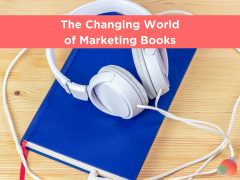 Until July 2017, I worked for a marketing agency in Toronto.
Until July 2017, I worked for a marketing agency in Toronto.
I constantly spoke with my clients about the amount of content swirling around their desired customer.
I held countless meetings discussing how to create content that stood out, content their consumers would actually want to consume.
As many do, I spent time talking about customers choosing to flip through social content from friends and family, read the news, watch a funny YouTube video, or binge an entire Netflix series in one day.
Those consumers could choose to do any of those things, and so much more, instead of watching my client’s branded Facebook Live Q&A.
I work in publishing now.
Currently, I’m trying to get consumers to engage with my marketing material instead of the multitude of other options.
And I am also trying to get them to buy a book that I want them to sit and read instead of engaging in a multitude of other options.
I’m not just competing against other book publishers for air time, but against the new Queer Eye series, the video game quest that’s only open today, and the live TV news conference.
I’m trying to get you to spend your free time reading instead of playing with your kids outside.
The more entertainment options there are to monopolize your free time, the less you’ll spend engaging with books.
And there are a lot of entertainment options out there.
A Re-focus on Audiobooks
One of the most exciting changes in publishing now is a re-focus on audiobooks.
Since I joined the publishing world, Audible broke into Canada and Kobo launched their audiobook service.
There’s a stronger focus from publishers and retailers alike on creating high-quality audiobook content to make each recording a unique, entertaining experience.
Audiobooks also present an interesting marketing opportunity as we try to get consumers (readers and non-readers) to embrace the format, and continue title-specific marketing.
If you live in Toronto, you may have seen a recent campaign from my colleagues (I stake no claim on the campaign, simply watched in awe from the sidelines) suggesting you turn your daily commute into a journey.
While keeping in mind the scramble for consumer free time, the focus here is to find free time for entertainment choices you didn’t know you had.
Read whatever book you want, but just try an audiobook and watch it transform your commute.
My company produces many audiobooks in-house, which gives us that title-specific marketing opportunity.
Here’s a video promoting Our Homesick Songs by Emma Hooper:
While the video does market the book in all forms, the intent is to give it an audio-first message reminding consumers there’s more than one way to consume a book.
Ultimately, I’d be thrilled if you bought it in any format.
Changing Media Landscape
Unfortunately, our media landscape is getting smaller and smaller.
We can no longer count on the media to spread the word about our new books to the extent we once did.
Publicists work tirelessly to secure stories and reviews about our books locally and nationally, but the problem every industry faces is the shrinking number of outlets and space.
Yet in publishing, we still allow media outlets to be the primary source of content about our books.
Here’s an experiment: Google with the intent of finding a list of books. For example, “best books for my book club” or “new novels this summer.”
When scanning the first page of search results, I find exclusive lists from media outlets in the U.S. and Canada.
I don’t see any content from publishers.
In an industry where word-of-mouth drives sales, SEO is a huge untapped opportunity for publishers. We can take control of our content.
Local Media, Social Media
Another victim of decreased media opportunities is the ten-city, cross-country, author tour.
A big driver of author tours are the local media opportunities as they travel.
But with the loss of so much local media, and national media based firmly in Toronto, tours are now few and far between.
And that means fewer opportunities for local author events across the country. This is a missed opportunity for one-on-one connections with readers.
Thankfully, we do have social media. Building an author’s brand on social media is just as important as any company investing in those channels.
We know readers are loyal to authors they love.
And when they find a book they enjoy those readers want to consume everything else the author wrote.
An author with large and active social channels has a whole community of practically guaranteed book sales.
That’s an engaged following hungry to learn about the next book.
It also allows authors to connect with their fans again, regardless of any planned tours or events.
In the End, It’s Still Books
Regardless of channel or medium, the beautiful thing about marketing books is I get to tell stories about stories.
And unlike so many other brands and products I’ve marketed in the past, books come with built-in brand affinity.
It comes down to ensuring potential readers know how and where they can read, and what book to read next.
Once I’ve sold them on that, the book delivers the rest.